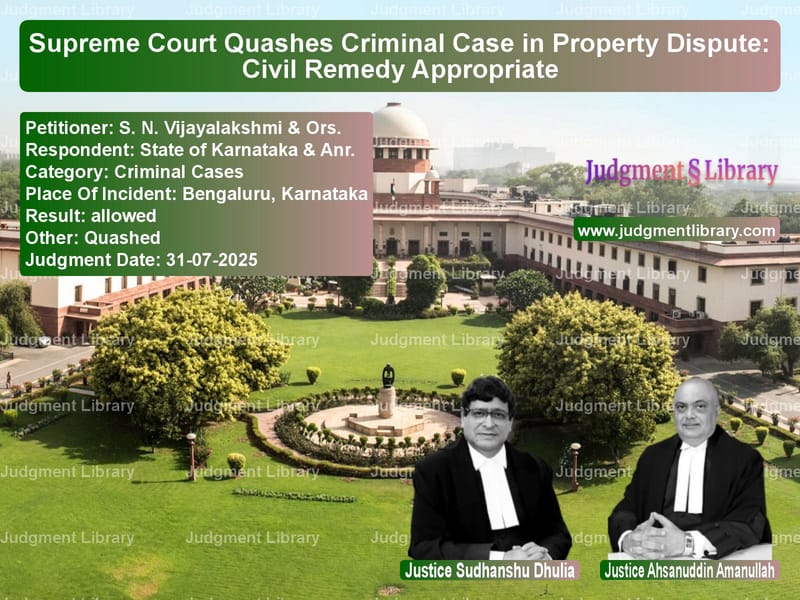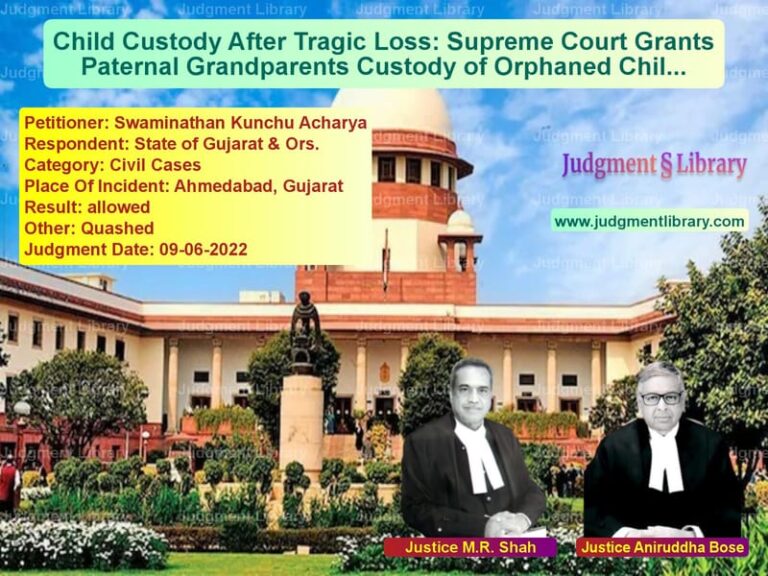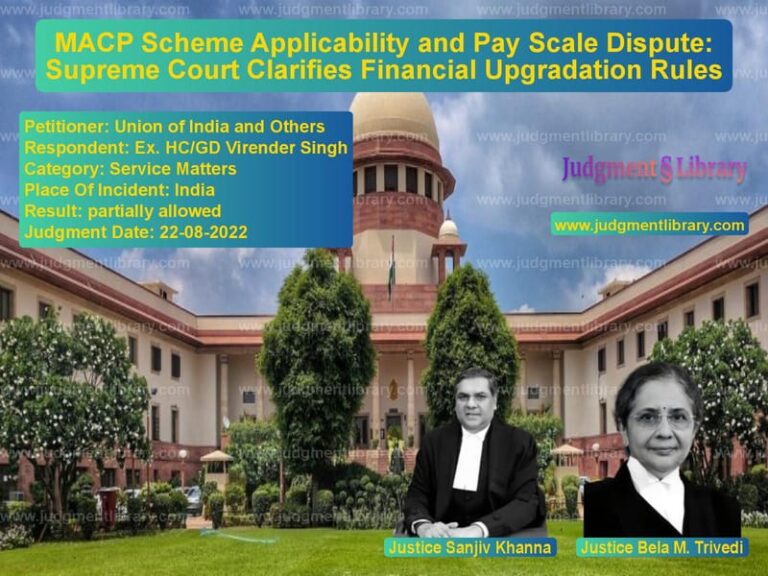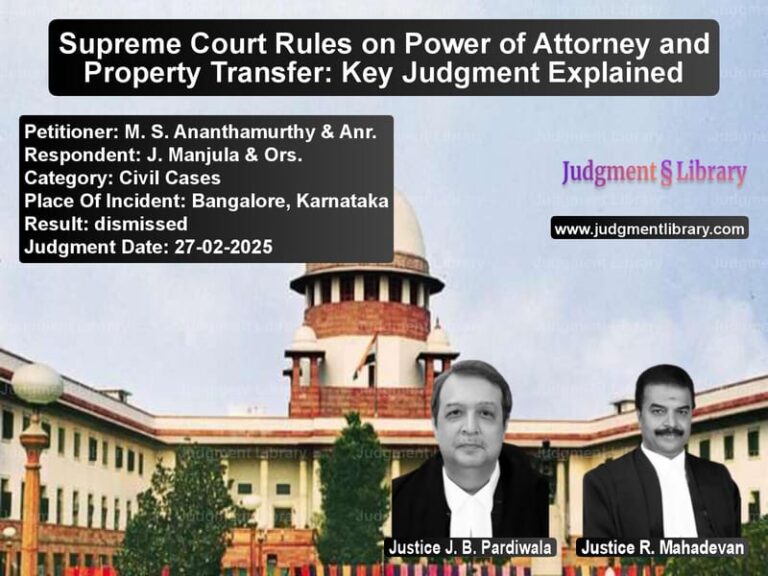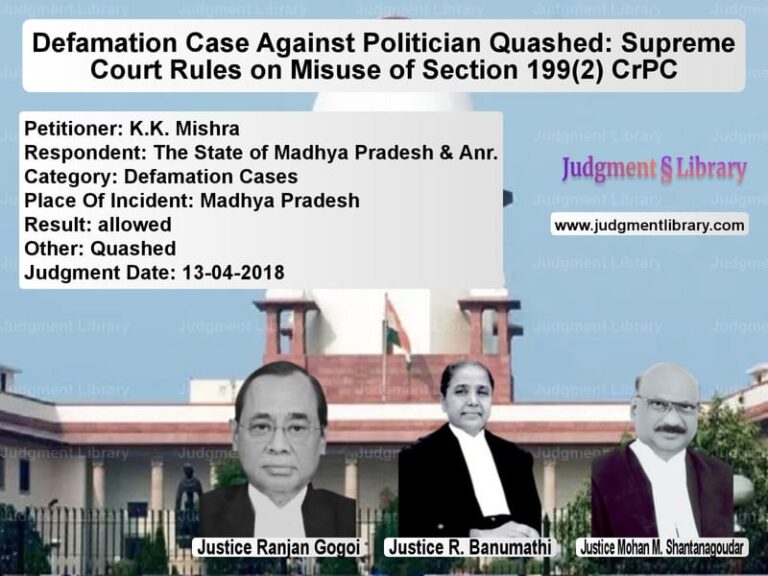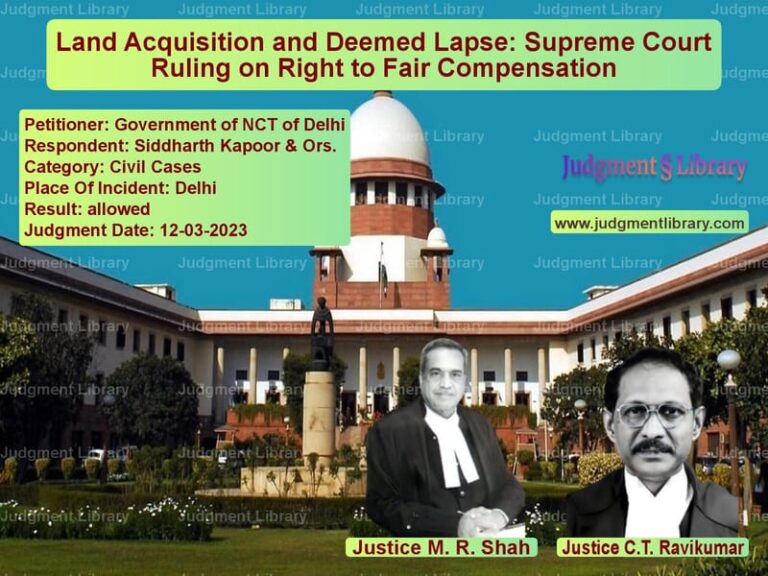Supreme Court Quashes Criminal Case in Property Dispute: Civil Remedy Appropriate
In a significant judgment that clarifies the distinction between civil disputes and criminal offenses, the Supreme Court has quashed criminal proceedings against family members embroiled in a complex property dispute in Bengaluru. The case involving S.N. Vijayalakshmi and others versus the State of Karnataka highlights the crucial legal principle that not every broken contract constitutes a criminal offense, even when substantial financial interests are involved. The judgment serves as an important reminder that the criminal justice system should not be used as a tool to settle essentially civil disputes.
The dispute centers around a valuable property in Bhoopasandra Village, Bangalore North Taluk, measuring approximately 6 acres. The property had a long and complicated history involving multiple owners, acquisition proceedings by the Bangalore Development Authority (BDA), de-notification, and extensive litigation spanning several decades. The current appellants are family members of the original owners who had inherited rights to this valuable urban property.
The Agreement and Subsequent Developments
The core of the dispute began on November 30, 2015, when the appellants entered into an Agreement to Sell (ATS) with respondent Keerthiraj Shetty for a consideration of Rs. 3.5 crores. Shetty was acting as a nominee for one Ravishankara Shetty, who had allegedly been helping the family with litigation concerning the property since 1996. Along with the ATS, the appellants executed a General Power of Attorney (GPA) in favor of the complainant, authorizing him to take necessary steps to clear the title issues and make the property marketable.
The complainant alleged that after he helped resolve the legal issues and the property’s title became marketable, the appellants refused to honor the agreement. Instead, they revoked the GPA, executed a release deed among family members, and subsequently transferred the property through a gift deed to one of the appellants. This led the complainant to file both a civil suit for specific performance of the ATS and a criminal complaint alleging cheating and criminal breach of trust.
Appellants’ Arguments
The appellants, through their senior counsel, made several crucial arguments challenging the maintainability of the criminal case. They contended that “the essential ingredients of Sections 415 and 420 of the IPC are conspicuously absent in the FIR. There is no mention of any inducement by the appellants of the complainant from the inception nor of any dishonest intention at the time of making of the promise in question.”
Regarding the charge of criminal breach of trust under Section 406 IPC, they argued that “the essential ingredients… pertaining to criminal breach of trust i.e., entrustment, misappropriation, conversion etc. are completely missing from the FIR.” They pointed to the complainant’s own statement that “after the increase in the market value of the said property, the accused started cheating the complainant,” which they argued militated against any claim of inducement at the inception.
The appellants also relied on the decision in Delhi Race Club (1940) Limited v State of Uttar Pradesh to argue that “it is now settled law that an FIR cannot be maintained under both Sections 406 and 420 of the IPC as the ingredients of both Sections are mutually exclusive and cannot co-exist.” They emphasized that “the dispute inter-se the parties is purely of a civil nature, which is maliciously being given a colour of criminality.”
Complainant’s Submissions
The complainant, through his senior counsel, argued that the criminal proceedings were justified. He maintained that “it is well-settled that at the stage of an FIR, the Court does not interfere if the complaint on the face of it discloses the commission of offences, as alleged.” He emphasized that the appellants had received Rs. 2,02,00,000 from various sources, including Rs. 2 lakhs at the time of executing the ATS and Rs. 2 crores from M/s Legacy Global Realty through a separate Memorandum of Understanding.
The complainant argued that the appellants’ actions in first canceling the GPA, then executing release deeds and gift deeds clearly demonstrated their intention to cheat him of his valuable rights under the ATS. He contended that all these facts needed police investigation and that the Magistrate had rightly ordered an investigation.
Supreme Court’s Legal Analysis
The Supreme Court, after examining the factual matrix and legal provisions, delivered a comprehensive judgment quashing the criminal proceedings. The Court first addressed the legal requirements for offenses under Sections 406 and 420 IPC.
Regarding criminal breach of trust under Section 406 IPC, the Court observed: “From a bare reading of Section 405 of the IPC, criminal breach of trust would arise only in a situation where the accused in any manner has been entrusted with property, or with any dominion over property and dishonestly misappropriates or converts the same to his own use… Here, it is not a case where the accused were entrusted with the subject property. The subject property belongs to them and they had rights over it as owners with title. Thus, the very foundation for invoking Section 406 of the IPC falls to the ground.”
On the charge of cheating under Section 420 IPC, the Court analyzed Section 415 and concluded: “In the present case, we do not find that by deceiving the complainant, the appellants had fraudulently or dishonestly induced him to deliver the property to them or to any other person or to consent that any person shall retain any property or intentionally induced the person so deceived to do or omit to do anything which he would not do or omit if he were not so deceived.”
The Court made a significant observation about the co-existence of civil and criminal proceedings: “If the element of criminality is there, a civil case can co-exist with a criminal case on the same facts. The fact that a civil remedy has already been availed of by a complainant, ipso facto, is not sufficient ground to quash an FIR… The obvious caveat being that the allegations, even if having a civil flavour to them, must prima facie disclose an overwhelming element of criminality. In the absence of the element of criminality, if both civil and criminal cases are allowed to continue, it will definitely amount to abuse of the process of the Court.”
Court’s Final Ruling and Observations
The Supreme Court ultimately allowed the appeal and quashed the FIR and all consequential proceedings, including the chargesheet and cognizance order. The Court summarized its conclusion: “Thus, we do not find any criminal aspect in the allegations ex-facie. Moreover, be it noted, the complainant has filed a civil suit for reliefs already enumerated above.”
However, the Court expressed serious concern about the larger issues involved in the case, particularly regarding the conduct of statutory authorities. The Court noted: “Common citizens who were the beneficiaries of the acquisition by the BDA have been denied the benefits thereof, and we have no hesitation in saying so, what could only be termed as collusive litigation between the BDA and the appellants. The obvious reasons are writ large on the facts and circumstances of the case. This Court cannot, and would not, turn a blind eye to such blatant misuse of the law and acts of omissions/commissions, especially by statutory authorities.”
The Court also extended the benefit of its judgment to a co-accused who had not filed an appeal, noting that “Parity would so demand, in the facts and circumstances, as also to serve the cause of justice.”
While quashing the criminal proceedings, the Court imposed important conditions to protect the interests of justice. It directed that “no third-party rights will be created or given effect to in the subject property by the appellants” pending the outcome of related proceedings filed by the BDA before the Supreme Court. The Court also clarified that the civil suit for specific performance filed by the complainant could continue.
This judgment reinforces the important legal principle that criminal law should not be invoked in essentially civil disputes, and serves as a caution against using criminal proceedings as pressure tactics in contractual disputes. At the same time, the Court’s observations about the conduct of statutory authorities highlight the judiciary’s role in ensuring that public bodies act in the public interest rather than enabling private gains at the cost of common citizens.
Petitioner Name: S. N. Vijayalakshmi & Ors..Respondent Name: State of Karnataka & Anr..Judgment By: Justice Sudhanshu Dhulia, Justice Ahsanuddin Amanullah.Place Of Incident: Bengaluru, Karnataka.Judgment Date: 31-07-2025.Result: allowed.
Don’t miss out on the full details! Download the complete judgment in PDF format below and gain valuable insights instantly!
Download Judgment: s.-n.-vijayalakshmi-vs-state-of-karnataka-&-supreme-court-of-india-judgment-dated-31-07-2025.pdf
Directly Download Judgment: Directly download this Judgment
See all petitions in Fraud and Forgery
See all petitions in Property Disputes
See all petitions in Contract Disputes
See all petitions in Specific Performance
See all petitions in Judgment by Sudhanshu Dhulia
See all petitions in Judgment by Ahsanuddin Amanullah
See all petitions in allowed
See all petitions in Quashed
See all petitions in supreme court of India judgments July 2025
See all petitions in 2025 judgments
See all posts in Criminal Cases Category
See all allowed petitions in Criminal Cases Category
See all Dismissed petitions in Criminal Cases Category
See all partially allowed petitions in Criminal Cases Category

